Eni has reached a binding agreement with Hilcorp, one of the largest private companies in the United States, for the sale of 100% of its assets in the Nikaitchuq and Oooguruk oil fields in Alaska. This transaction is part of Eni’s strategy to rationalize its upstream activities by rebalancing its portfolio and divesting non-strategic assets.
Financial objectives and strategy
Eni aims to generate net cash flow of 8 billion euros between 2024 and 2027. Anticipated revenues will come from the enhancement of the upstream portfolio, the reduction of interests in major exploration discoveries, and access to new capital. The sale of the Alaskan assets to Hilcorp represents a key step in achieving these financial objectives. In 2023, the Nikaitchuq and Oooguruk fields produced around 20,000 barrels of oil per day, or 1.2% of Eni’s consolidated production. Hilcorp, renowned for its expertise in Alaskan oil operations, is the ideal buyer for these assets.
Terms and conditions of the agreement
Completion of this transaction is subject to the necessary regulatory approvals and customary conditions. The value of the transaction will be announced at closing, with financial estimates placing potential revenues between $428 and $855 million. This operation, in line with Eni’s strategy of rationalizing its upstream activities, could have positive implications for the company’s shares, making it easier to achieve the divestment target for this year.
Sales context
Eni recently sold a 10% stake in energy services group Saipem, generating 393 million euros. This sale, combined with that of the Alaskan assets, strengthens Eni’s financial position and supports its long-term strategic objectives. The Oooguruk oil field, located in the Beaufort Sea around 5 kilometers off Alaska’s north coast, has been in production since 2008. Eni acquired the entire field in 2019 by buying out the 70% held by Caelus Natural Resources Alaska LLC.






















